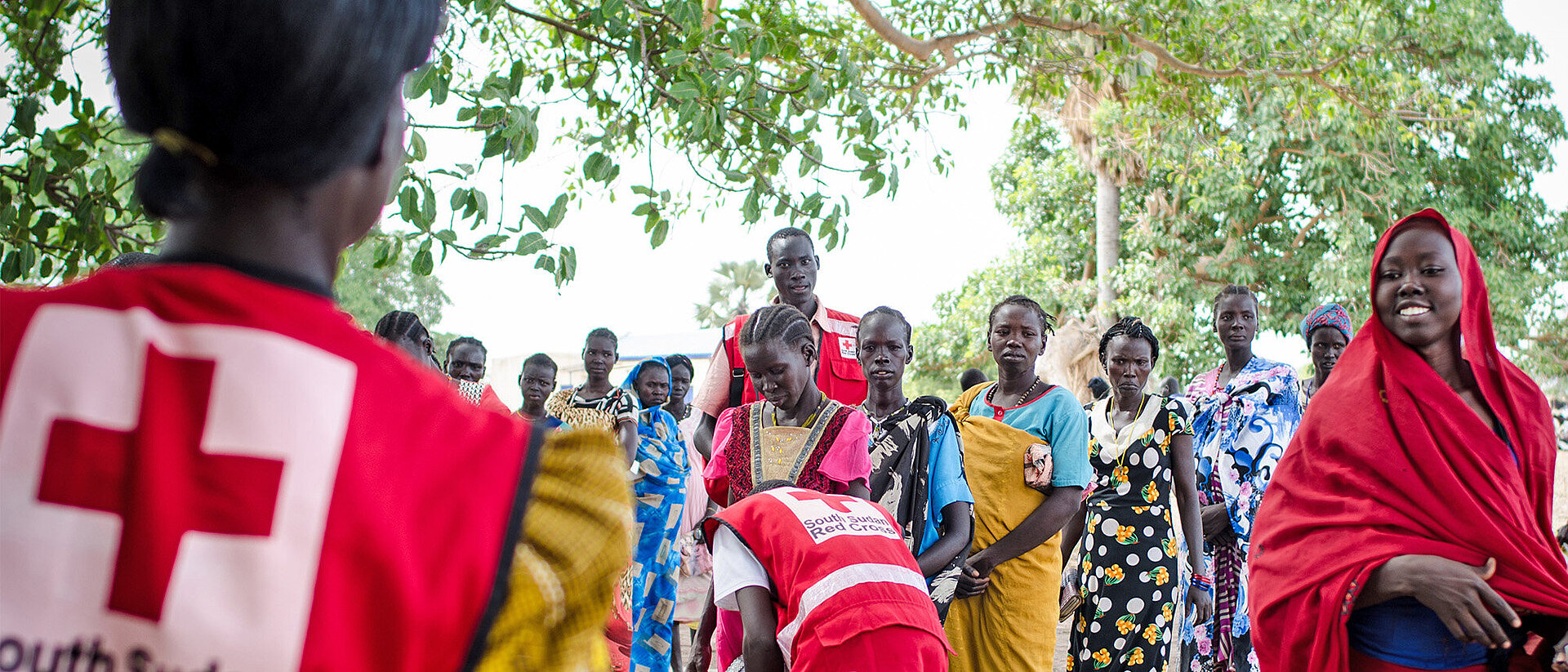
Preparing for Crises and Disasters
In South Sudan, people face a multitude of risks and threats, ranging from internal conflicts to severe weather occurrences. However, the population is often not sufficiently prepared for emergency situations. With the assistance of the German Red Cross (GRC), the South Sudan Red Cross is enhancing its disaster risk management to mitigate the effects of hazards and crises on the vulnerable population.
Climate Change, Natural Hazards and Crises
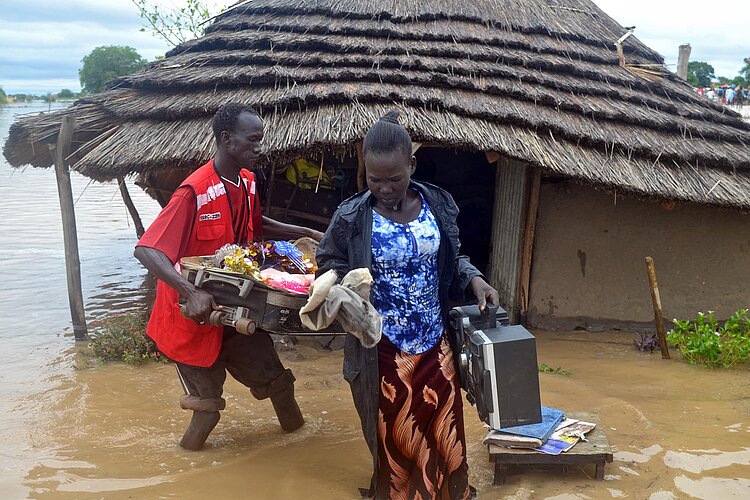
The already vulnerable population in South Sudan is grappling with the consequences of climate change, natural hazards as well as epidemics and conflicts. Many individuals lack the necessary knowledge and resources to adequately shield themselves from dangers or seek assistance. Simultaneously, authorities frequently find themselves overwhelmed and incapable of mounting suitable responses to crises, further exacerbating the vulnerability of affected communities.
While the government has initiated the establishment of initial Disaster Risk Management frameworks, the management of the intricate crises within the country remains in its nascent stages. The South Sudan Red Cross, being one of the largest humanitarian actors in the country, similarly faces limitations in terms of personnel and structures, hindering its ability to fully meet its responsibilities.
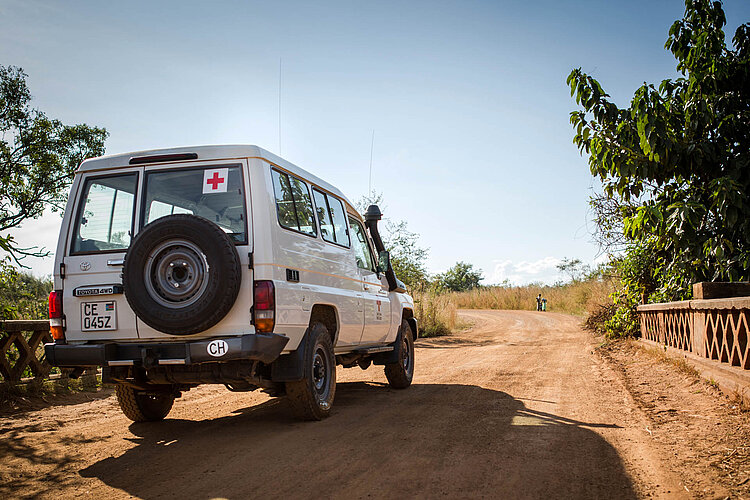
Project Objectives
To reduce the impact of crises and disasters on vulnerable populations, the South Sudan Red Cross is dedicated to accomplishing three key priority objectives:
- Enhancing the capacities of the South Sudan Red Cross (SSRC)
- Bolstering the resilience of vulnerable communities
- Reinforcing SSRC's role as a national auxiliary to the government
The German Red Cross (GRC) is committed to supporting its partner organisation on both the national and local fronts. Volunteers, technical personnel, and board members receive comprehensive training and essential equipment. One such training is EVCAs, a participatory process of risk analysis. Communities identify and prioritise risks and hazards with the help of SSRC and develop action plans to reduce and mitigate said risks. Based on the action plans drawn up, SSRC can implement measures together with the communities within the framework of its Red Cross mandate. SSRC branches will also be developed into regional hubs to strengthen surrounding smaller branches, respond more quickly and decentralise the organisation. The activities in detail include, among others:
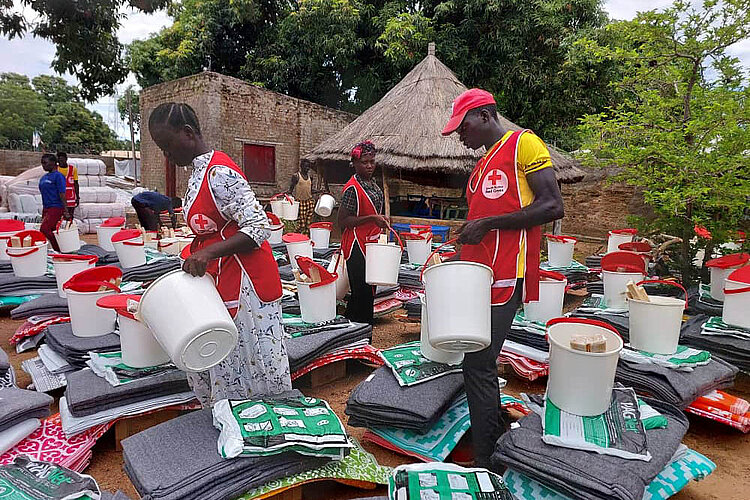
- Training SSRC volunteers and staff in EVCA to analyse risks and capacities/performance capabilities
- Creating, training and equipping of Emergency Action Teams and National Disaster Response Teams.
- Reviewing and updating Emergency Contingency Plans at both headquarters and branch level
- Further developing Disaster Risk Management processes
- SSRC participation in external and national workshops, trainings and regional forums, as well as key coordination mechanisms
- Developing a framework concept for regional centres (regional hubs)
Fostering Resilience through Risk Identification, Mitigation, and Emergency Preparedness
Empowered by skilled Red Cross personnel and volunteers, community members will gain the ability to discern risks, capacities, and vulnerabilities within their localities. This will enable them to formulate actionable plans aimed at minimizing the impact of potential hazards. This approach enhances community ownership and active involvement in fortifying their own resilience. The following comprehensive activities are detailed:
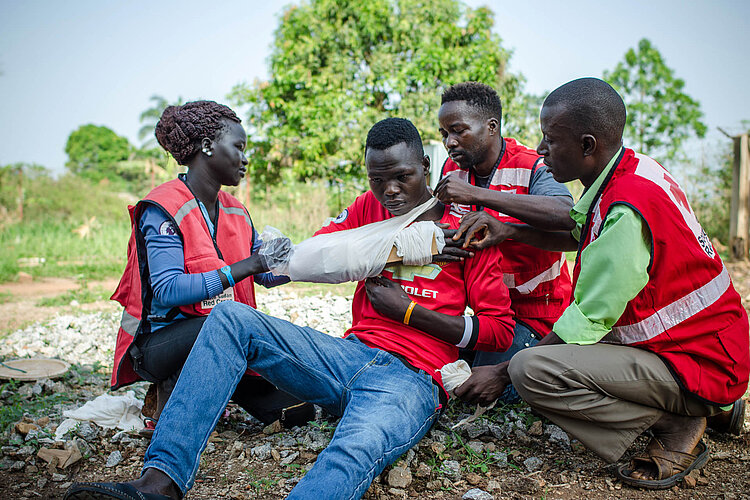
- Conducting risk and capacity analyses (eVCA) in communities
- Providing training for Community Disaster Response Teams (CDRTs)
- Developing community-oriented action plans
- Carrying out simulation exercises in communities
- Organising training sessions and awareness-raising initiatives for the public regarding risks and hazards (e.g., first aid training and awareness events).
Strengthening the South Sudan Red Cross as a National Aid Society
In its capacity as a national humanitarian entity, the South Sudan Red Cross assumes the responsibility of collaborating with the government to implement humanitarian assistance in addition to initiatives focused on risk reduction and disaster preparedness. The overarching objective is to enhance the government's emergency response capabilities, reducing reliance on humanitarian organisations. This objective hinges on close collaboration, clear delineation of SSRC’s responsibilities, and the augmentation of its capacities through resources like personnel, knowledge, and equipment. This approach empowers communities to better manage potential shocks, fostering their resilience and sustainable development. The specific activities encompass:
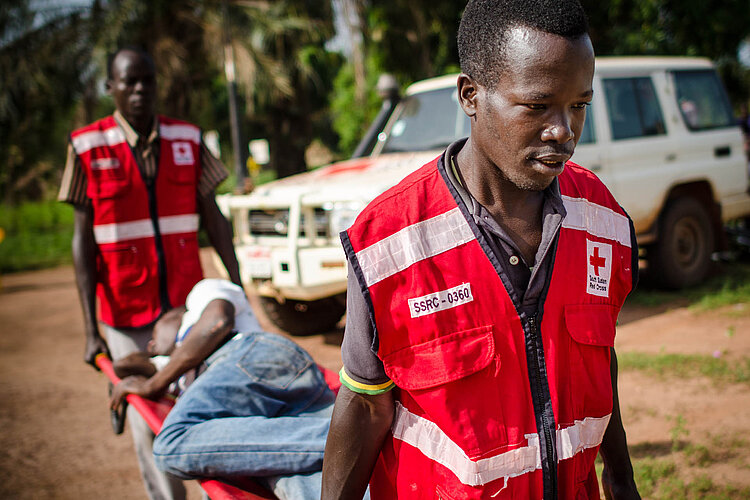
- Develop, execute and assess an advocacy strategy to establish and adopt a national legal framework for Disaster Risk Management
- Collaborate with both national and local governments to clarify the role of the SSRC as a national relief agency and define its responsibilities and competencies in disaster response
- Foster active engagement of the SSRC within the national Rapid Response Mechanism (RRM) platform and other key coordination mechanisms.
- Organise and conduct SSRC training sessions and campaigns for government employees at both local and national levels.
The project
Target: Strengthening the institutional capacity of the South Sudan Red Cross (SSRC) for improved disaster risk management (DRM) and community-based resilience building - Phase I
Duration
01/2023 bis 12/2025
Project volume
€ 1.335.000
Funding
BMZ social structural aid (SSA), GRC/donations
Region
Headquarters in Juba; branches in Wau, in Kuajok, Raga, Aweil and Tonj (Western Bahr el-Ghazal and Warrap in South Sudan)
Partner
South Sudan Red Cross